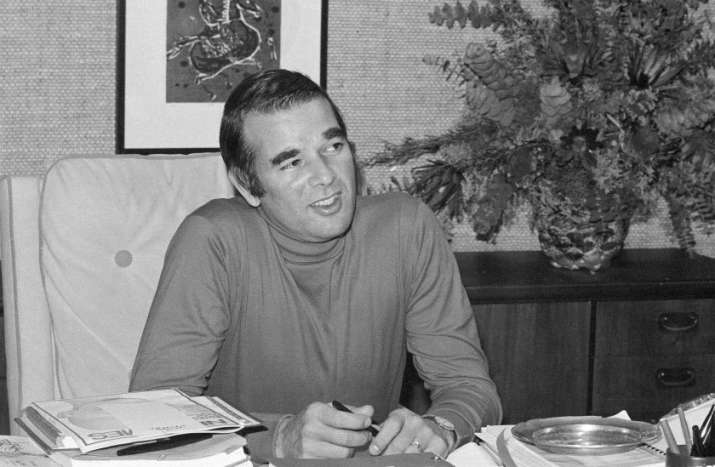
Oscar-winning producer Alan Ladd Jr. has died at the age of 84
Alan Ladd Jr., Oscar-winning producer and studio boss who is dead as 20th Century Fox executive greenlights ‘Star Wars’. He was 84 years old. Ladd died Wednesday, his daughter Amanda Ladd-Jones, who directed the documentary “Laddy: The Man Behind the Movies,” wrote in a Facebook post. No cause of death was given. Ladd Jr., son of “Shane” actor Alan Ladd started out in the film business as his father’s stuntman, but later became one of its chief – and most-loved – executive officers. .
As studio head at Fox and MGM (twice), Ladd—affectionately known as “Ladd”—has some 14 of the best, including “Young Frankenstein” (1974), “The Rocky Horror Picture Show” (1975) -Picture was included in the nominees. “Chariots of Fire” (1981) and “Blade Runner” (1982). As an independent producer, Ladd Jr. helped produce films including “Once Upon a Time in America” (1984), “The Right Stuff” (1983). Gone, Baby Gone” (2007) and Mel Gibson’s “Braveheart” (1995), for which he won Best Picture.
All told, Ladd produced or flagged films that have won over 50 Oscars and 150 nominations. And he did it in an easy, tight-knit manner that earned him widely praised by stars and filmmakers. Esquire magazine placed him on the cover in 1978 with the headline: “Triumph of the Laid-Back Style.”
A former talent agent for stars such as Robert Redford and Judy Garland, Ladd Jr. joined 20th Century Fox in 1973, and later became president. There, he flagged off George Lucas’s $10 million science-fiction film—the original script was titled “The Adventures of Luke Starkiller as Taken from the Journal of the Wheels, Saga 1, Star Wars”—when something in Hollywood saw any potential in it.
Lucas once recalled his meeting with Ladd, whose belief in the filmmaker began with an early screening of Lucas’ “American Graffiti” before its release. “The only reason for this was that Allen liked American graffiti” and said, “I don’t understand this movie, I don’t understand it at all,” Lucas said in Tom Schon’s 2004 book “Blockbuster”. But I think you’re a genius and I want you to make it.”
Even as the studio’s faith in “Star Wars” faltered, Ladd kept his faith in what would go on to become one of the highest-grossing films of all time. Their only false move may have been to extend Lucas’s trading rights to grant instead when “American Graffiti” became a hit.
“My biggest contribution to Star Wars was keeping my mouth shut and standing by the picture,” Ladd told Variety.
“Star Wars” wasn’t the only classic sci-fi movie Ladd Greenlighted at Fox. Ladd also supported “Alien”. But the same year that the 1979 film opened, after a conflict with Fox president Dennis Stanfil, Ladd left to form the independent production company Ladd Company.
On his own, Ladd produced films such as “Body Heat” and “Police Academy”, in addition to “The Right Stuff” and “Blade Runner”. But the Ladd Company, weighed down by some disappointments and huge budgets for films like “The Right Stuff,” struggled to be profitable. In the mid-1980s, Ladd moved to MGM, which he would eventually lead.
His two stints in the studio were less successful than his time at Fox, but he produced films there such as “Moonstruck” (1987), “Rain Man” (1988), “A Fish Called Wanda” (1988) and “Thelma and Louise”. Made it (1991).
When a loan default put MGM in the hands of Credit Lyonnais, the French bank ousted Ladd, who was eventually given $10 million to take his contract and two projects with him. When “Braveheart” won Best Picture, some viewed it as the widely acclaimed Ladd—Richard Donner once famously said “there are snakes in this business and then there’s Alan Ladd”—getting the last laugh. .
“I think it’s a sweet justice,” Ladd told the Los Angeles Times in 1996. “If I had been more eloquent, I would thank Credit Leonis for treating me poorly and allowing me to take this project with me. In fairness, MGM couldn’t afford to make this movie at the time.” Paramount could.” However, Ladd was never known for his composure. When he accepted the Oscar as one of three producers, his full speech was: “I want to thank my family Am. Thank you.”
Ladd is survived by his wife Cyndra Pincock; children Kellian, Tracy and Amanda; half-brother, David Ladd; half-sister, Alana Ladd; and half-sister Carol Lee Stuart-Ladd.